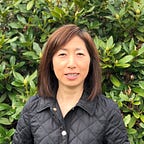The Business of Being a Tiger Mom
Part 2 | Prioritize Education
“Mom, guess what? I got an A on my English paper!” Douglas stormed out of his bedroom with joy. He then said with a grin “Remember? The other day you said my paper wasn’t good.” His English teacher was supposedly the hardest grader at his high school.
The truth is that his first draft was solid but not excellent. Knowing his natural knack for English and Social Studies, I straightforwardly told him his paper didn’t reflect his true capability. “When are you going to ever tell me I did well?” he responded to my rather unflattering feedback. Eagerly motivated to prove me wrong as he always had done over the years, he locked himself in his bedroom for hours to refine his paper.
Amy Chua’s book “Battle Hymn of the Tiger Mother” in 2011 recognized and popularized “tiger mom”, which led to national debates about parenting as well as TV shows in Singapore and China. My kids never read the book but claim that I am not just a tiger mom but a hardcore one. Is this because of my ethnicity or because of my apparent no-frills attached parenting style, or both? I have oftentimes wondered. With this curiosity, I reflected on my parenting style, interviewed my boys and my white American spouse for their feedback, and spoke to fellow Asian mothers in our community (I’ll just call them “tiger moms”) who were willing to share their own stories. I discovered that tiger motherhood is in the Asian moms’ DNA, deeply rooted in our cultural upbringing regardless of our socio-economic background and amplified by these key principles:
Principle #1: Have High Expectations
Principle #2: Prioritize Education
“Even if you have many other strengths, you can’t be accepted in Korea if your academic achievements are not up to a certain standard and I wanted to free my children from that,” said Mrs. Kim who lives with her 12-year daughter alone in Washington State, over 5,000 miles away from her husband in Seoul. While happily married, Kim’s husband is a gireogi appa (literally translated “goose dad”), a South Korean term that refers to a man who works in Korea while his wife and children live in an English-speaking country for the sake of the children’s education. Presumably, it is inspired by the fact that geese are a species that migrate, just as the gireogi appa father must travel a great distance to see his family.
I met moms like Kim in our community who only get to see their husband once or twice a year, and their stories underscore that they prioritize their children’s education more than their own lives at the expense of emotional and financial tolls on the family.
Higher education, a key enabler to achieve high expectations, allows financial independence, social mobility, access to power, and more in East Asia. Once a student passes their notorious national college entrance exams with high marks and is admitted to a top school, their future is said to be set. This importance of education holds true for many Asian immigrants who have almost nothing to fall back on other than themselves and their families to start a financially independent life in a new country.
Although diverse with unique history, cultures, and languages that trace back to more than 20 different countries, the Asian communities put their first and utmost importance on education. Nothing can unite and rally these diverse communities more than their children’s education.
To some families, having a pool and a fancy car can seem like the pinnacle of the American Dream but to Asian parents, nothing is more gratifying than their children reaching their dream leveraging the power of their education.
